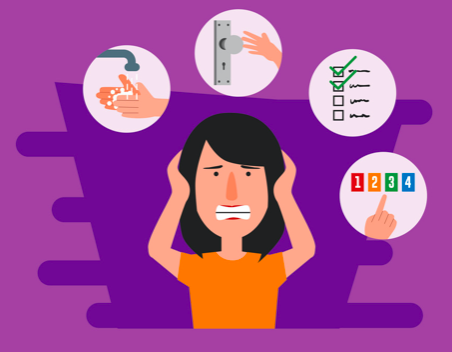Obsessive-compulsive disorder (OCD)

What is OCD?
Obsessive-compulsive disorder (OCD) is a mental health disorder that is characterized by unwanted thoughts (obsessions) and repetitive behaviors (compulsions). People with OCD may feel the need to perform these behaviors to relieve the anxiety caused by their obsessions.
What are the symptoms of OCD?
The symptoms of OCD can vary from person to person, but they may include:
- Obsessions: Unwanted, intrusive thoughts, images, or urges that cause anxiety or distress.
- Compulsions: Repetitive behaviors or mental acts that a person feels the need to do to relieve the anxiety caused by their obsessions.
- Distress: People with OCD may feel significant distress or anxiety as a result of their obsessions and compulsions.
- Impairment: OCD can significantly impair a person's ability to function in their daily life.
What causes OCD?
The exact cause of OCD is not fully understood, but it is thought to be a combination of genetic and environmental factors. Some environmental factors that may contribute to OCD include exposure to certain viruses or toxins during pregnancy, or experiencing a stressful life event.
How is OCD treated?
There is no cure for OCD, but there are treatments that can help manage the symptoms. The most common treatments for OCD are medication and therapy. Medications, such as selective serotonin reuptake inhibitors (SSRIs), can help reduce the anxiety and obsessions associated with OCD. Therapy, such as cognitive-behavioral therapy (CBT), can help people with OCD learn how to manage their thoughts and behaviors.
What is the prognosis for OCD?
The prognosis for OCD varies from person to person. Some people with OCD may experience a full recovery, while others may have ongoing symptoms. However, with treatment, most people with OCD can live relatively normal lives.
What is the difference between OCD and OCPD?
Obsessive-compulsive disorder (OCD) and obsessive-compulsive personality disorder (OCPD) are two different mental health disorders. OCD is characterized by unwanted thoughts (obsessions) and repetitive behaviors (compulsions), while OCPD is characterized by a rigid and perfectionistic personality style.
What is the difference between OCD and Tourette syndrome?
Tourette syndrome is a neurological disorder that is characterized by involuntary movements (tics) and vocalizations (vocal tics). OCD is a mental health disorder that is characterized by unwanted thoughts (obsessions) and repetitive behaviors (compulsions). While people with Tourette syndrome may also have OCD, the two disorders are not the same.
What is the difference between OCD and hoarding disorder?
Hoarding disorder is a mental health disorder that is characterized by the excessive accumulation of possessions. OCD is a mental health disorder that is characterized by unwanted thoughts (obsessions) and repetitive behaviors (compulsions). While people with hoarding disorder may also have OCD, the two disorders are not the same.
If you are concerned that you or someone you know may have OCD, it is important to see a doctor for evaluation. Early diagnosis and treatment can help improve the outcome for people with OCD.